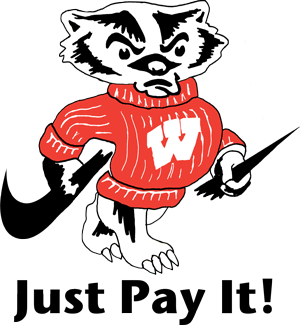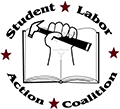The Case for Severance: Why Students Are Telling Nike to “Just Pay It!”

What’s going on?
A serial abuser of workers’ rights has struck again, right at the heart of our campus. Nike Inc., a producer of Badgers apparel, continues to make clothing with our name on it despite recent revelations of sweatshop labor.
The basic facts are simple: in January 2009, Nike abruptly closed two of its factories in Honduras, laying off over 1,200 unionized workers. Nike then refused to pay the workers the severance and back pay they were owed, totaling over $2.1 million, in clear violation of Honduran law.
In addition, workers at one of the factories faced severe and highly illegal retaliation in response to their efforts to form a labor union. In short, this is a company with little regard for its workers, and even less regard for the standards they swore to uphold.
What does this have to do with us?
Nike is a licensee of the University of Wisconsin, which means they pay us for the right to make clothing with UW logos — like Bucky Badger — on it. In order to become a licensee, Nike signed a code of conduct which requires that basic workers’ rights standards be upheld in the company’s factories.
When Nike signed that code of conduct, it made a promise to ensure that our Wisconsin gear is produced under fair and decent conditions, where workers have the right to be paid for their work and the right to join a union free from intimidation and retaliation. By refusing to pay its workers what they are owed, Nike has broken that promise.
We’re not going to stand for that, and we can fight back, with your help.
So what are we going do about it?
So far, the UW-Madison administration has contended that “engagement” with Nike is the best approach. Administrators naively believe that if we just talk things over with Nike long enough, as we’ve been doing for months, they’ll see that we’re right and pay the workers. But Nike is a rational corporation — not a human being — and has already decided not to pay, because that will be more profitable.
That’s why we need to change the equation and start hitting Nike where it really hurts: in the pocketbook. Until the university severs its contract, Nike will never take our objections seriously.
But we’re just one university — how will we ever make a difference?
Thankfully, we’re not alone! As part of an international movement known as United Students Against Sweatshops, students all over the country — and even in Canada and the UK — are demanding that their universities kick Nike off campus.
Just last year, UW-Madison joined over 100 other universities in terminating its contract with Russell Athletic over similar abuses. In response, after months of insisting that it wasn’t responsible, Russell caved in and came to an unprecedented agreement with the union, resulting in the reemployment of over 1,800 workers and tough new anti-sweatshop standards throughout the company’s factories in Honduras.
We’ve done it before, and we can do it again.
Is this the first time Nike’s been caught exploiting sweatshop labor?
At first, refusal to pay wages and severance might not sound so bad. But consider: this is hardly the first time Nike has been caught seriously violating labor law. At one of the factories in question, workers had formed a union in order to fight for better working conditions. Shortly thereafter, when an inspector from the Ministry of Labor, accompanied by federal police, tried to visit the factory, management locked the gates and refused access. The very same day, management fired, in a targeted fashion, all of the union’s leaders.
Not only are actions like these illegal, they also have a chilling effect on workers’ independent efforts to improve their wages and working conditions. What kind of message does it send if every time workers stand up and object, they are harassed, threatened, and fired without being paid what they’re owed?
But this is only the latest chapter in Nike’s long history of exploiting cheap labor. As recently as 2008, a Nike factory in Malaysia was exposed where hundreds of workers were held in conditions of indentured servitude, their wages withheld and passports confiscated. Is it any surprise that a company like this would refuse to pay its workers?
Reference
For more details on the Hugger and Vision Tex factories, check out the Worker Rights Consortium report.
